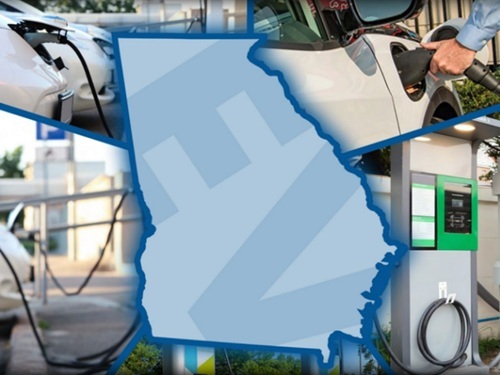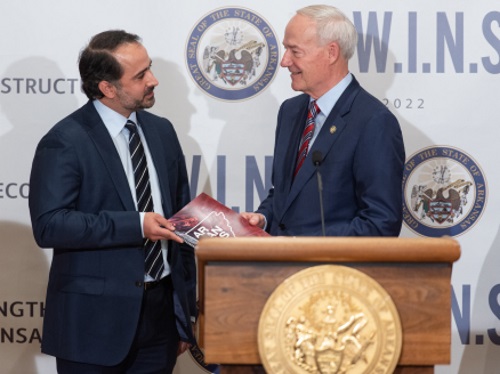The Arkansas Council on Future Mobility recently unveiled a comprehensive plan to make the state a nationwide leader in mobility development efforts.
[Above photo by the Arkansas Governor’s Office]
The council’s findings resulted from 10 months of work by government officials, corporate leaders, and private investors to make Arkansas a global hub for the mobility industry by 2030 – a goal established by Governor Asa Hutchinson (R) (seen above at right).
The report addresses the rapidly changing future of moving people and goods by ground, air, sea, and space, in a cleaner, faster, and safer manner –all while at lower cost as well.

Gov. Hutchinson formed the Arkansas Council on Future Mobility – comprised of 26 advisory and 18 appointed members who are private investors, government and public utility administrators, academic experts, and corporate leaders – in early 2022. The council includes retail giant Walmart, trucking company J.B. Hunt, the University of Arkansas, Tulsa Innovation Labs, Tyson Foods, railroad conglomerate Union Pacific, and Southern Arkansas University, among many others.
“The report the council produced is invaluable and can serve as a blueprint for how we can achieve our goal of being the global leader in future advanced mobility,” Gov. Hutchinson said in a statement.
“It also reinforces the fact that we need to take a thoughtful, strategic approach to growing this industry,” he added. “This growth will not come by accident and there are no do-overs.”
Several key findings from the report – which encompasses drones, autonomous and electric vehicles, electric scooters and bicycles, and other related technologies – underpin critical principals Arkansas plans to incorporate within its statewide mobility efforts. Those include:
- A community’s access to mobility ties directly to its quality of life; a key facet maintaining the fabric of society.
- Transportation and mobility comprise the largest source of carbon dioxide or CO2 emissions in the world. Reducing the industry’s impact on the environment has become a priority for companies and governments.
- The convergence of so-called “exponential technologies” is disrupting every facet of mobility. Yet such technologies will help humanity move people and goods cleaner, faster, safer, and at lower cost – on the ground, air, sea and space.
- It is crucial for state officials to work in tandem with the private sector and educational system to establish and grow the entrepreneurial ecosystem needed for Arkansas to flourish in future mobility.
Concurrently, Arkansas is working with Oklahoma to make their overall region a national hub for advanced mobility technology development.

In August, Gov. Hutchinson and Oklahoma Governor Kevin Stitt (R) held a press conference to highlight their collaborative effort to boost support for the growth of the advanced mobility industry, which includes drones, electric and autonomous vehicles, battery manufacturing, and various transportation and logistics solutions.
Those joint efforts include creating new research and testing space, support local mobility startups, attract new companies, and convene industry corporations to test and scale new technologies.
Gov. Hutchinson said at that event that the mobility industry is projected help create up to 55,000 new jobs in careers such as software engineering, cybersecurity analytics, drone piloting, and vehicle maintenance, as well as mechanical and industrial engineers – with average earnings in the advanced mobility sector potentially 50 percent higher compared to other industries in Arkansas and Oklahoma.
 States
States
Podcast: Flashing LED Lights Can Boost Roadway Safety
December 5, 2025 States
States

